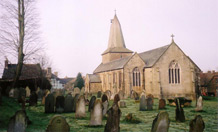
The church and graveyard at North Tawton. (Photograph © Peter K Steinberg)
Plath in Devon
Devon seen through words, writing and literature forms part of a project called WordQuest Devon involving the development of a series of free public lectures on literary themes.
The first, ‘Sylvia Plath in Devon’, will take place on Wednesday 1 June at 5pm at the University of Exeter in the Queen’s Building on the Streatham Campus.
The quest is to get people writing, walking and experiencing Devon through its literary heritage. The University of Exeter is working in partnership with Devon Libraries, Aune Head Arts and Cyprus Well to develop the project which will map places where words about Devon have been written. Christine Faunch, Head of Heritage Collections and Culture Services at the University of Exeter, said, ‘The project will create a set of journeys linked to literary themes and living writers across Devon, set out in a series of maps. This will include a printed trail map, identifying sites to seek out across the county.’
Professor Tim Kendall, Head of English at the University of Exeter, will be giving the first in a series of talks about literature in Devon, starting with the American poet and novelist Sylvia Plath. Professor Kendall will explore the relationship of Plath’s work to Devon’s landscape and communities. Plath came to Devon with her husband and daughter in late August 1961. She was extraordinarily prolific here writing over 70 poems (including most of the Ariel poems) as well as a radio play, several articles and short stories, some prose character sketches of the locals, and countless letters. The fifteen months which she spent in the county were the most fruitful of her short career.
Professor Kendall said, ‘I want to consider the extent to which Devon shaped Plath’s poetry. It is not stressed often enough that she was one of the great landscape poets, but in her later work the boundary between self and environment dissolves: landscape become mindscape, and vice versa. I will explore the extent to which Devon shapes the psychodramas of Plath’s poetry.’
The lecture is free-of-charge and open to members of the public; advanced booking is essential. Please telephone 01392 725879 or email: N.R.Glanville@exeter.ac.uk to reserve a seat.
Date: 1 June 2011
